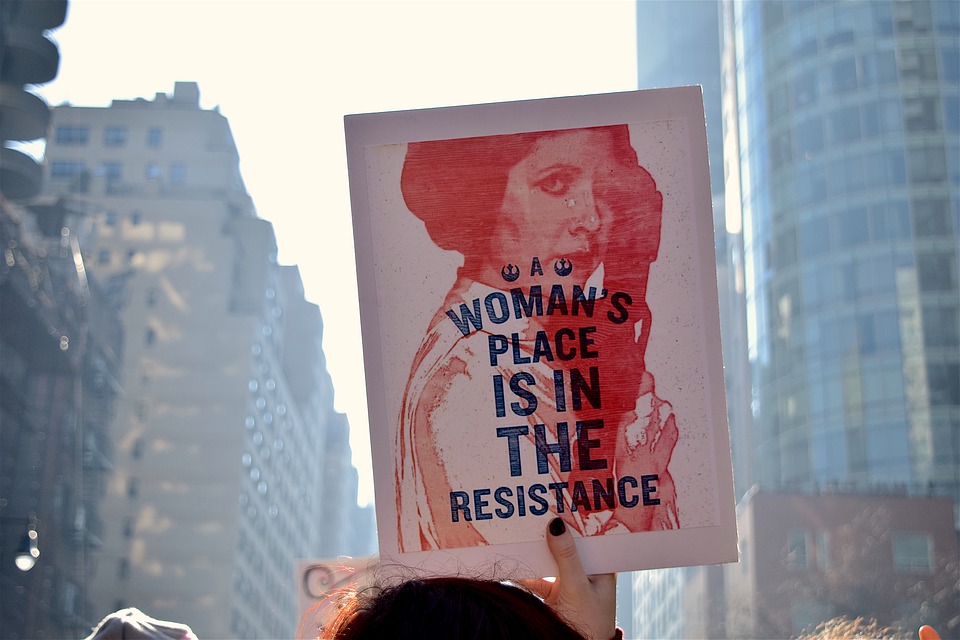This is an opinion piece by Claudia López, from our “Cronistas de la Cotidianidad” (Chroniclers of Daily Life) section.
A while back, I attended a university talk on women’s rights. I remember that one man said, “Women now have more rights than men.” Someone else said, “Women are now in charge – we have the power.” Listening to this, I thought that nothing could be further from reality. While no one should be afforded more privilege than anyone else in a democratic society, and every national constitution professes to respect human rights by proclaiming that we are all equal before the law, the truth is that women are at a disadvantage in our society. Nevertheless, we still hear the familiar refrain that “women can do anything they set their minds to.”
Progress has certainly been made, thanks to the efforts of many feminists throughout history. Almost everywhere in the world, women have the right to vote, and depending on the country, most have access to paid employment. There are women working as scientists and in other careers that used to be the exclusive domain of men. However, there are still enormous inequalities between women and men. Women experience discrimination and gender violence every day, which prevents any significant improvement in our quality of life, individually and as a whole, and denies us our right to enjoy the same opportunities as men.
It’s important to consider that the personal development of millions of women has been hampered because they are discriminated against for reasons in addition to their gender. They experience layer upon layer of discrimination because of their economic status, age, disability, or sexual orientation, or because they are irregular migrants, displaced persons, belong to an indigenous community, and so on. However, we have been led to believe that because we have been empowered and endowed with certain rights, we can occupy almost any position if we try hard enough. But that half-truth or fallacy is the product of a patriarchal system working hand-in-hand with exploitative capitalism.
Many women do indeed achieve a certain level of professional status and personal well-being. However, this has often been the result of individual over-achievement and major sacrifice, and that is far from justice. Before I became aware of feminism, I always heard expressions like “she’s very successful,” or “she’s highly accomplished, but never married and now can’t have children,” or “she focused on her career,” as if having a career was incompatible with choosing to have a family or getting married. It’s assumed that women have to choose one or the other. This doesn’t happen with men, who are able to live in both worlds thanks to women who seemingly have to clone themselves to handle all the work that, in fairness, should be shared equally.
Many women have been lifted up as examples of “empowerment” or included on lists of “the most powerful women” in politics, business, or academia. We have asked ourselves questions like, how much have these women sacrificed to reach these positions? What does being a powerful woman imply for a patriarchal and capitalist system? Do these women have to emulate masculine behaviors that are characteristic of systems of economic oppression? It’s important to think about these things. Yet the ongoing pandemic experience has exposed the fallacy of this female empowerment narrative. I have observed that, except in feminist environments, the ubiquitous conferences, classes, etc., broadcast over social networks usually have men directing the discussion and debate on these issues. This is not for lack of female experts in every discipline and area of human knowledge.
So, while we have been empowered with the existence of these topics, men are always the stars leading them. I recently participated in a legal training course facilitated by a male colleague. I tried to recall an occasion when I received a legal training course taught by a woman, and very few came to mind. This is not due to a lack of capable women in the legal profession. It’s because women have been treated as second-class citizens. The words of men are more highly valued than the words of women. Also, we are often unavailable because the patriarchy has assigned women the duties of caregiving and housework. The latter activity isn’t talked about much because it’s invisible, exhausting and exclusive to women. Housework involves the administration and planning of everything that happens in the home, the indispensable activities that make everything “work,” such as shopping, planning meals, keeping an eye on the children’s vaccinations, medical appointments, doing laundry, etc.
Highlighting all the work that women have been forced to do by the patriarchal system is not intended to victimize us, but rather to demand justice. The discourse today focuses on the inclusion and participation of women in all areas of individual development, but doesn’t call on men to become heavily involved in the home, and to share the housework equally. This has prevented women from gaining an equal footing. More awareness is needed along with the justice that is lacking, since many female experiences aren’t recognized, even in spaces that are thought to be more progressive. It’s important to normalize the expectation that men make headway in taking on shared responsibility for raising children and doing housework. But it’s also important to think about those women who don’t live with the fathers of their children. If these circumstances are ignored, then women will try to juggle too many balls in order to further their development, or will simply stop trying to develop themselves. This happened to me in the legal training course I mentioned earlier. I had to leave the session before it ended, because it started late and ran longer than expected.
My two-year-old son was knocking at the door of the room where I was watching the online course. I didn’t hesitate to go see what he needed, since I strongly believe that family time must be respected. However, it’s astounding that even in environments assumed to be more respectful of rights or that are more progressive, no thought is given to the women affected by overtime work demands. Our training and development is often left unfinished, especially if we are caring for children. The world moves on with work schedules that usually don’t consider the time constraints on women, especially mothers. The thinking seems to be that we have made our choices so it’s up to us to see how we can manage, how we can further our careers. This is exactly the same type of discrimination that deepens the inequality between men and women, since most male colleagues would have no problem working overtime, knowing that their spouses are taking care of every little detail at home.
Thus, it’s important to recognize that the real needs of women would not go unnoticed if there were a greater awareness that child care or housework responsibilities should be borne equally by men and women. This awareness would lead to more opportunities and options for women to participate and contribute in these spaces, free from all discrimination. We could then change the patriarchal paradigm to a gender-based focus that restores, dignifies and supports motherhood. Men could take responsibility for exercising this egalitarian paternity, as it’s a question of justice and equity. We could educate new generations in the meaning of true equality, sensitivity, and support. Therefore, it’s imperative to rethink the concept of empowerment that has been touted so far, this patriarchal mandate of the “superwoman” ideal that has been used to exploit us, and has forced us to depersonalize ourselves in an effort to single handedly meet this standard, without men who share equal responsibility. Let’s aspire to a freedom erected upon our own desires, well-being, and needs. In the words of Mary Wollstonecraft, “I don’t want women to have power over men, but over themselves.”






